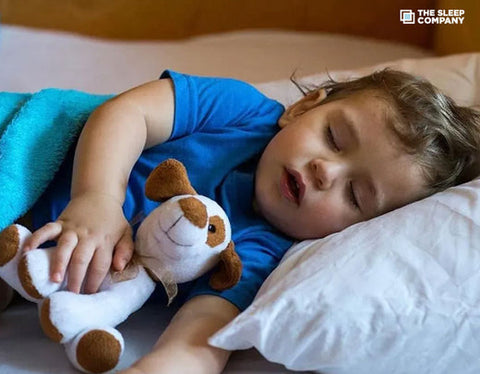My Cart

How Can You Help Your Teenager to Sleep Better?


The teen years are a pivotal time in one’s life. The brain and body grow rapidly, and the transition to adulthood brings substantial changes to emotions, personality, social and family life, and academic performance. During this period, sleep is crucial, functioning behind the scenes to help kids to perform at their best. Unfortunately, studies show that many teenagers receive significantly less sleep than they require.
A lack of sleep negatively impacts an individual’s physical, emotional, and mental health and can lead to increased stress. For children and teens especially, sleep is critical for healthy development and well-being.
How much should a teenager sleep?

Sleep research suggests that a teenager needs between eight and 10 hours of sleep every night. This is more than the amount a child or an adult need. Yet most adolescents only get about 6.5 – 7.5 hours of sleep per night, and some get less.
Chronic sleep deprivation is caused by not receiving enough sleep on a regular basis. This may have a significant influence on a teen’s life, negatively affecting their mental health and raising their risk of sadness, anxiety, and low self-esteem. It can also have an impact on school performance.
Why teens can have trouble sleeping?

Teens have a poor reputation for staying up late, napping in class, and oversleeping for school. However, teen sleep habits differ from those of adults and younger children.
The body’s circadian rhythm is an internal biological clock that is reset throughout adolescence, causing a person to sleep and wake up later. This shift is most likely due to melatonin, a brain hormone that is released later in the night in adolescents than in children and adults. Teens may find it more difficult to fall asleep early as a result of this.

There are many factors that keep teens from getting enough sleep. Causes for their lack of sleep include the following:
- Rapidly changing bodies
- Busy schedules
- Active social lives
- A wrong view of sleep
How parents can help their teens get better sleep?

Parents play a critical role in ensuring that their children receive the sleep they require. You should pay great attention to your child’s sleeping, acting, and feeling patterns. They’ll show you indicators that they’re not getting enough rest. Check to see whether your adolescent exhibits any of the following behaviours:
- Most mornings he has problems waking up
- In the early afternoon, he becomes agitated
- During the day, he quickly falls asleep
- Has there been a dramatic decline in grades?
- On weekends, he sleeps for significant amounts of time
Parents can urge their children to consult a doctor while simultaneously working with them to improve their sleep hygiene over time. According to several studies, kids who have a strict bedtime established by their parents receive more sleep and are less drowsy during the day.
Another option for parents is to request their local school system for later start times. A number of school districts have tried delayed beginnings and found them to be beneficial in terms of attendance and academic achievement.
Parents should also help their teenagers to prevent overscheduling and obligations that can cause stress and to trade-off with appropriate time management.
Sleep tips for teens

Most teens will sleep much better if they simply develop the habits of good sleep hygiene. Sleep hygiene consists of basic tips that help you develop a pattern of healthy sleep. See the Resources section of this site to find out how anyone can start down the path to better sleep. Because teens are in a stage of life that is very unique, the tips listed below are even more important for them:
1. Parents should create a calm atmosphere in the home at bedtime. A comfortable bed should include a comfortable mattress. Buy mattress online and help your teenager sleep better every night.
2. Teens should have a regular, relaxing routine just before bedtime. They often have busy, hectic schedules. They need a chance to unwind at night. A cool and cozy mattress can help them sleep deeper.
3. To help them relax, teens should avoid activities that will excite their senses late in the evening. They should find another time for computer games, action movies, intense reading, or heavy studying.
4. They should not have anything with caffeine (including soda and chocolate) after 4:00 pm.
5. They should also avoid smoking and drinking. Along with hurting their health, nicotine and alcohol will disturb their sleep.
6. A regular exercise routine and a healthy diet will help them sleep better at night.
7. Keep the lights dim in the evening. Open the curtains or blinds to let in bright light in the morning. This helps keep their body clocks set at the right time.
8. If they must take a nap, they should keep it to under an hour.
It can be hard for teens to get enough sleep during the week. They may need to wake up later on weekends. But they should not wake up more than two hours later than the time when they normally rise on a weekday. Sleeping in longer than that will severely disrupt a teen’s body clock. This will make it even harder to wake up on time when Monday morning arrives.
If you want to successfully help your teenager to get better sleep at night, then try an extra comfy mattress. Millennials are obsessed with everything smart, why not try a smart mattress for your teenager?



































































